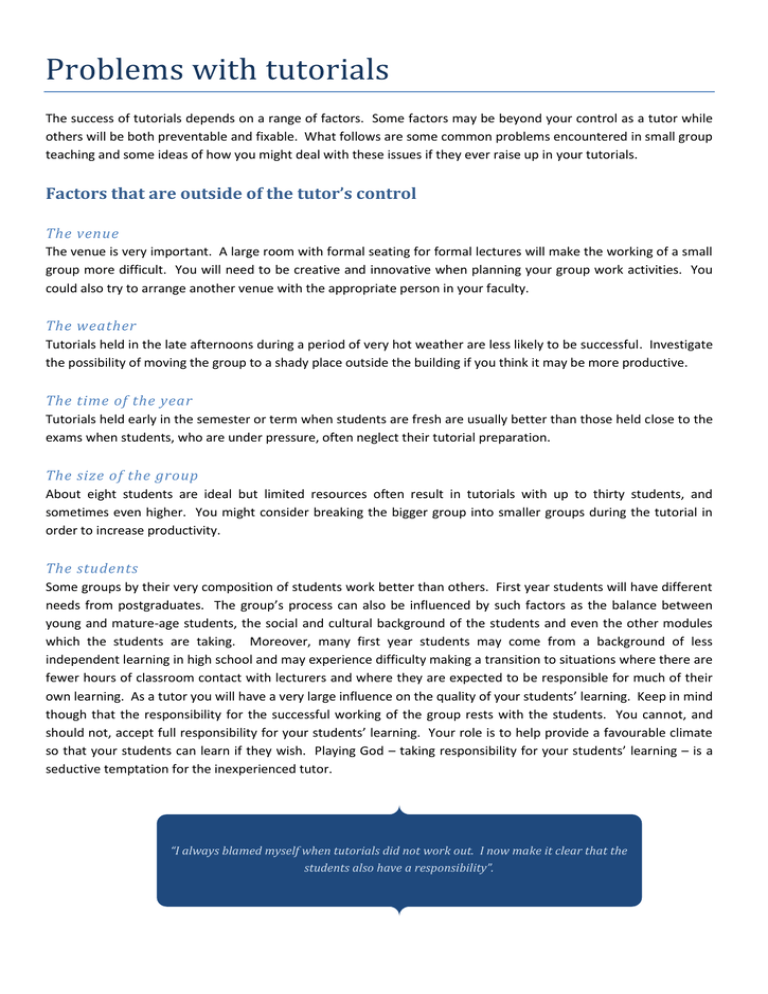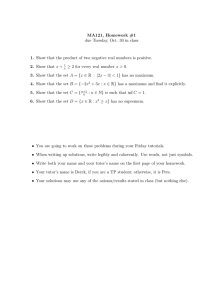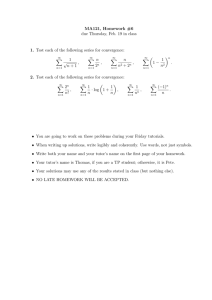Problems with tutorials
advertisement

Problems with tutorials The success of tutorials depends on a range of factors. Some factors may be beyond your control as a tutor while others will be both preventable and fixable. What follows are some common problems encountered in small group teaching and some ideas of how you might deal with these issues if they ever raise up in your tutorials. Factors that are outside of the tutor’s control The venue The venue is very important. A large room with formal seating for formal lectures will make the working of a small group more difficult. You will need to be creative and innovative when planning your group work activities. You could also try to arrange another venue with the appropriate person in your faculty. The weather Tutorials held in the late afternoons during a period of very hot weather are less likely to be successful. Investigate the possibility of moving the group to a shady place outside the building if you think it may be more productive. The time of the year Tutorials held early in the semester or term when students are fresh are usually better than those held close to the exams when students, who are under pressure, often neglect their tutorial preparation. The size of the group About eight students are ideal but limited resources often result in tutorials with up to thirty students, and sometimes even higher. You might consider breaking the bigger group into smaller groups during the tutorial in order to increase productivity. The students Some groups by their very composition of students work better than others. First year students will have different needs from postgraduates. The group’s process can also be influenced by such factors as the balance between young and mature-age students, the social and cultural background of the students and even the other modules which the students are taking. Moreover, many first year students may come from a background of less independent learning in high school and may experience difficulty making a transition to situations where there are fewer hours of classroom contact with lecturers and where they are expected to be responsible for much of their own learning. As a tutor you will have a very large influence on the quality of your students’ learning. Keep in mind though that the responsibility for the successful working of the group rests with the students. You cannot, and should not, accept full responsibility for your students’ learning. Your role is to help provide a favourable climate so that your students can learn if they wish. Playing God – taking responsibility for your students’ learning – is a seductive temptation for the inexperienced tutor. “I always blamed myself when tutorials did not work out. I now make it clear that the students also have a responsibility”. Factors within the tutor’s control The class seems reluctant to participate Students, particularly first years, often expect the tutor to “spoon-feed” them the information necessary for passing the exam. They are not ready to have to participate and often have little experience of self-directed or cooperative learning processes and environments. Many are happy to let the tutor tell them what to do, say, think and write. Unfortunately, such attitudes are not conducive to stimulating discussions and it can be a considerable challenge for a tutor to draw students into discussion. Here are some ideas for tackling non-participation: Seek feedback and ask why they are not participating – it helps sometimes to talk to students outside of the class hours. Set specific tasks. For example, use buzz-groups and pyramids. Give students a few minutes to write down and clarify their ideas or questions before the discussion begins. Make sure you are facilitating the discussion, not dominating it. Give some responsibility to the students for leading and facilitating the discussion. Simply tell them you are not going to talk for half an hour and they can conduct the discussion themselves. Or, pull questions (generated earlier by the students) out of a box and have a student facilitate the class discussion until all questions have been answered. Individual students are silent Some students are scared to take part, because they are scared that they will look dumb or will say the wrong thing. Others are terribly shy. Some have a lack of confidence in an unfamiliar environment and just need a bit of gentle encouragement. Use open explorative questions Ask quiet students specifically, without embarrassing them (don’t be persistent if they don’t want to contribute) Work more in smaller groups Use role play and give the dominant students the quieter roles. Invite students to talk to each other and not always speak through you. Kidman (1994:23-24) offers a simple, but effective strategy to encourage shy students: “The best teachers of students are often other students. If you have a painfully shy or silent class member, it is sometimes useful to pair them with an empathic student in the class group. A more confident student draws the other one out and does some in-class coaching. That student will also bring concerns to the tutor’s notice that the other student didn’t feel comfortable about mentioning. This is another form of peer-tutoring, and one which has mutual benefits for both students.” One student dominates the discussion If one student dominates the discussion other group members can become restless or refuse to participate. You should cut any uncooperative or dominant behaviour short before it increases and threatens your positive learning environment. Some “big mouth” students may not even be aware that their behaviour offends or is inappropriate, and it should perhaps just be pointed out them. Others might however come to class with a specific agenda and interrupt others all the time repeatedly and knowingly, or may lack listening skills. You have to apply more specific and aimed strategies to handle these students. For example: Thank the student for his/ her contribution and then ask others to speak Use “Rounds” where everyone gets a chance Assign the dominant student to the task of recording and/or summariser of the discussion Sit next to talkative students so that it’s less likely that they will catch your eye and answer your question first Work more in small groups. Students are talking about social events rather than the content The students have probably completed the assignment or didn’t find it challenging enough. Give another assignment, or get back to the big group. Other strategies include change group formations and speaking to repeat “distracters” after the class. Students complain about how you run the tutorial Seek regular feedback by speaking to students before and after the class and through taking informal (as well as formal) student feedback at different times in the semester. Additionally, you can: Ask for suggestions Have a brainstorm on possible alternatives Explain why you do things Write critique and possible solutions on the board Look back to the ground rules / agreements that you got agreed with the students in the first semester and make sure that you keep your side of the agreement as well as the students. Set a re-evaluation (as a class) of the ground rules / agreements if things don’t work well Follow up all suggestions Students don’t listen to each other Remind them about the ground rules decided on in the first class or suggest that a new ground rule be implemented. You can reorganise groups or change seating allocation or try a new activity. Students haven’t done the reading or preparation One of the most common complaints of tutors is that it is difficult to lead a successful tutorial session if students haven’t done the necessary reading and preparation. As a tutor, you need to inspire your students to do the reading and preparation by making sure that it is relevant and interesting and not too obscure, technical or broad. In many cases the module coordinator determines the reading, which gives tutors little space in the last four of these areas, but as a tutor, you can still work hard to make the prescribed work relevant and thus more likely to be read through applying a few of the following strategies: During the first session, when you negotiate the ground rules or agreements, make sure that the completion of reading and class preparation is also on the list. Give students a feeling of responsibility and accountability right from the beginning Spend a bit of time introducing the reading and explaining its appropriateness of it to the next tutorial class as well as the course as a whole. Stimulate students’ interest or curiosity by explaining something about the writer, text or context Set up a couple of specific questions on which you could have a “quiz” at the beginning of the next session Encourage students to keep written track of their reading. Students seem unable to cope If a number of your students seem to be struggling, it may be because the course or module sets undue demands on them. If an individual student struggles to keep up with the work, it may be because he / she may lack the necessary skills or understanding to work at university level or that they are unable to concentrate due to unresolved personal problems. Pettigrove et al. (1999) suggest the following strategies: Discuss any general student difficulties around the course or module with the module coordinator Try to help individual students with any academic problem, unless it seems if they need the help and time of a specialist. If this is the case, refer them to Centre for Student Counselling and Development (Tel: 8084707) Students who experience problems with time management, stressor emotional problems or who need career counselling can also be referred to the Centre for Student Counselling and Development. Adapted from: Bertola, P. & Murphy, E. 1994. Tutoring at University: A Beginner’s Practical Guide. Paradigm Books. & A Handbook for VUW Teachers. “The students responded just to my acknowledgement that they are under pressure. It seemed to relax them a bit and helped the discussion” “I found that breaking up a large group into a few smaller groups really made a difference and the students certainly enjoyed it more because they were involved” “The more I taught, the more I realised just how very different each class could be – both within the same group and between others” “My initial overenthusiasm was actually counterproductive. Enthusiasm is a wonderful thing – but keep it in perspective and let the students do it for themselves”


